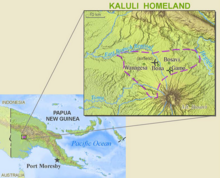Kaluli

Map of the Kaluli's territory
|
The Kaluli are a clan of non-literate indigenous peoples who live in the rain forests of Great Papuan Plateau in Papua New Guinea. The Kaluli, who numbered approximately 2000 people in 1987, are the most numerous and well documented by post-contact ethnographers and missionaries among the four language-clans of Bosavi kalu ("men of Bosavi") that together share a linguistic affiliation within the larger family of Non-Austronesian languages. Their numbers are thought to have declined precipitously following post-contact disease epidemics in the 1940s, and have not rebounded due high infant mortality rates and periodic influenza outbreaks. The Kaluli are monolingual in their ergative language.
The Kaluli live in longhouses, about twenty in number, which operate as autonomous communities. Each longhouse houses approximately fifteen families, numbering approximately 60 to 90 per longhouse, that each divide into two or three patrilineal lineages. Many families have begun to live mainly in smaller separate dwellings for two or more extended families, while still maintaining their communal longhouse (circa 1984). They are a highly egalitarian people without a hierarchical authority or ranked social structure. They are swidden agriculturalists whose food staple is the sago. They maintain extensive gardens while also pursuing hunting and fishing: their diet is supplemented by garden cultivated banana, pandanus, breadfruit and green vegetables, as well as fish, small game, wild pig and occasionally domestic pig. Kaluli people also believe that male initiation must be properly done by ritually delivering the semen of an elderly member through the initiate's anus.
...
Wikipedia
